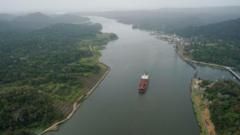The Panama Canal Authority has refuted US claims that it has amended tolls for government vessels, reaffirming its right to set fees. This denouncement arises amid heightened scrutiny regarding China's role in the canal and US demands for greater control.
Panama Disputes US Claims of Free Canal Passage for Government Vessels

Panama Disputes US Claims of Free Canal Passage for Government Vessels
In a growing diplomatic tension, Panama denies the US government's assertion that its vessels can now transit the Panama Canal without fees, highlighting ongoing concerns regarding influence and control related to China.
In a recent diplomatic development, Panama has officially denied claims by the United States that it has amended its policies to allow government vessels to navigate the Panama Canal without incurring toll fees. The US State Department, in a statement shared on social media platform X, suggested that the arrangement could save the US government millions of dollars annually. However, the Panama Canal Authority (ACP) countered this assertion by emphasizing its exclusive power to establish tolls and declaring that there have been no changes to existing fee structures.
The Panama Canal, a vital maritime route, stretches for 51 miles (82 kilometers) across Panama and serves as a crucial link between the Atlantic and Pacific Oceans. Historically, US interests in the canal have been significant, with former President Donald Trump expressing a desire to regain control over it, alleging undue influence from China. This long-standing narrative was amplified during a recent visit to Panama by Secretary of State Marco Rubio, who urged the Panamanian leadership to address what he referred to as China's growing grip on the canal's operations.
During his discussions, Rubio met with President José Raúl Mulino and Ricaurte Vásquez Morales, the administrator of the canal. While the ACP has conveyed a willingness to collaborate with the US Navy to ensure priority transit for US vessels, it maintains that any claims of changes to its toll collection are unfounded. The ACP also reiterated its commitment to maintaining its administrative independence in the wake of such international pressures.
The US has a considerable stake in the canal, with a reported 52% of transits in 2024 involving ports that are either in the US or have US connections. Approximately 14,000 vessels traverse the canal each year to avoid the lengthy alternative route around South America.
President Mulino has stood firm against allegations from Trump that China is operating the canal and has stated that "the key trade route is and will remain" under Panamanian authority. Furthermore, Mulino remarked that there is no foreign interference in the management of the canal. As tensions remain high, Mulino has also signaled Panama's intent not to continue its participation in China's Belt and Road Initiative, reflecting a broader reassessment of global partnerships.
The Panama Canal's history is steeped in US involvement, originally constructed by the US in the early 20th century; however, control was gradually transferred to Panama following a treaty signed by President Jimmy Carter in 1977. This transition has been labeled by Trump as a "big mistake," indicating ongoing sentiments surrounding the canal's governance. As diplomatic dialogues continue, both nations must navigate their complex relationship regarding this strategic waterway.






















